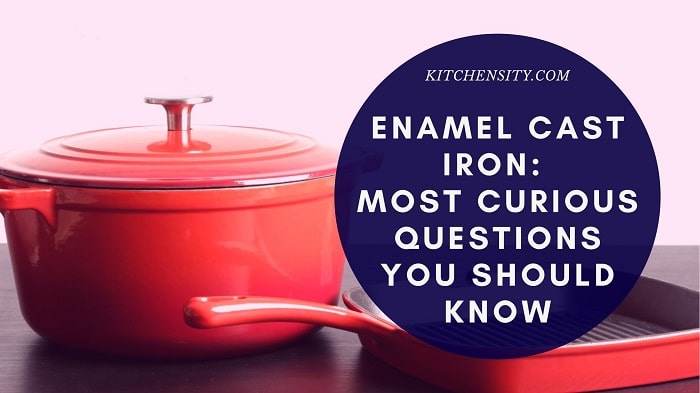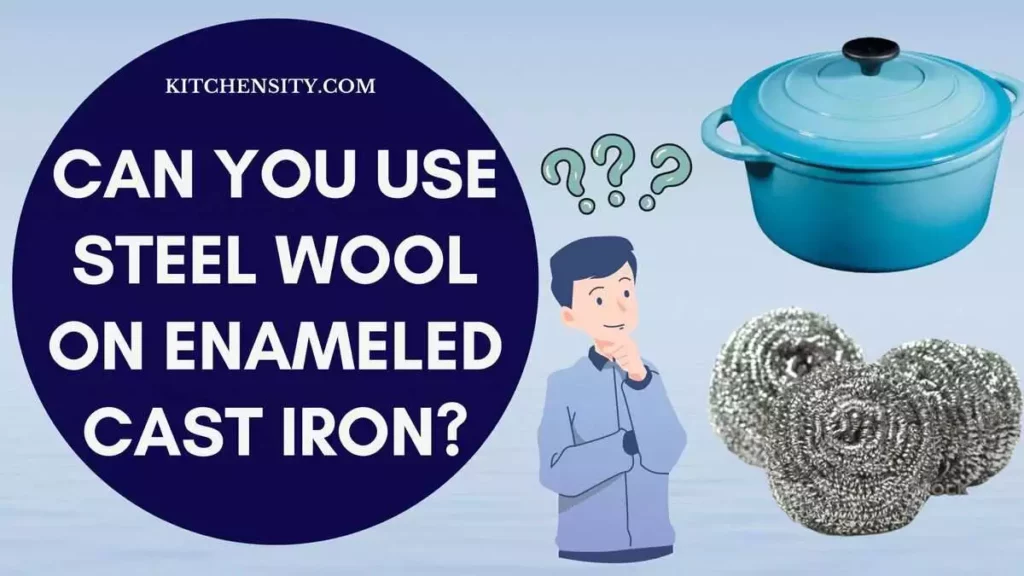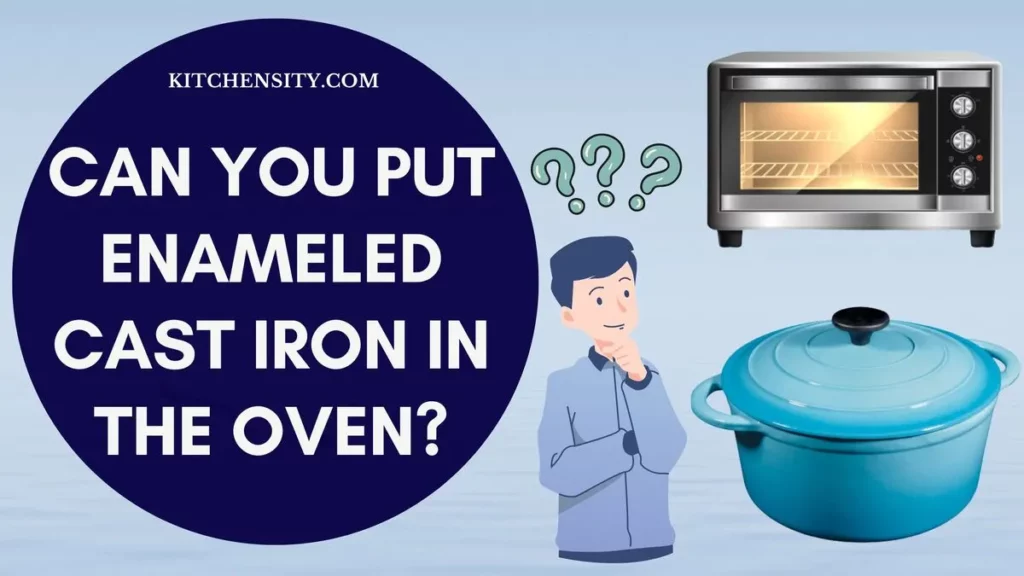When it comes to caring for our kitchen cookware, finding the right cleaning methods is essential.
Enameled cast iron cookware is a popular choice due to its durability and excellent heat retention.
However, when it comes to cleaning enameled cast iron, questions arise about the use of vinegar.
In this article, we will explore whether vinegar is safe to use on enameled cast iron and provide insights into its potential benefits and risks.
By understanding the proper cleaning techniques, you can ensure the longevity and performance of your beloved enameled cast iron cookware.

Table of Contents
- 1 Can You Use Vinegar On Enameled Cast Iron?
- 2 Using Vinegar On Enameled Cast Iron
- 3 Dilution Ratio And Recommended Application Methods
- 4 Precautions And Potential Risks Associated With Vinegar Use
- 5 Alternatives To Vinegar For Cleaning Enameled Cast Iron
- 6 Can You Use Baking Soda And Vinegar On Enameled Cast Iron?
- 7 How Do You Remove Stubborn Stains From Enameled Cast Iron?
- 8 What Can I Use To Clean Enameled Cast Iron?
- 9 Final Verdict
- 10 YOU MAY ALSO LIKE
- 11 FAQs
- 11.1 Is Baking Soda Safe On Enameled Cast Iron?
- 11.2 Can You Soak Enameled Cast Iron Overnight?
- 11.3 Can I Soak Enameled Cast Iron In Vinegar?
- 11.4 Will Vinegar Damage The Enamel Coating?
- 11.5 How Often Should I Clean My Enameled Cast Iron Cookware?
- 11.6 Are There Any Specific Types Of Vinegar Recommended For Cleaning?
- 11.7 Can I Use Vinegar To Remove Stubborn Stains On Enameled Cast Iron?
Can You Use Vinegar On Enameled Cast Iron?
Yes, vinegar can be used on enameled cast iron for cleaning purposes. It is a natural and effective cleaning agent that can help remove stains and residue from the surface. However, it’s important to use vinegar in moderation and follow proper dilution ratios to avoid potential damage to the enamel coating.
Also Read – Can You Put Enamel Cast Iron In The Dishwasher?
Using Vinegar On Enameled Cast Iron
Vinegar, particularly white vinegar, is a popular natural cleaning agent known for its mild acidity and antibacterial properties.
- It can effectively break down grease, remove stains, and tackle stubborn residue on enameled cast iron cookware.
- Its non-toxic nature makes it a preferred choice for those seeking eco-friendly cleaning options.
- The mild acidity helps dissolve grime and residue on the cookware’s surface.
- Vinegar can cut through grease and oils, making cleaning easier.
- It has antibacterial properties that help eliminate bacteria and microorganisms.
- Vinegar is safe for food contact and leaves no harmful residues.
- It provides an eco-friendly alternative to harsh chemical cleaners.
- Vinegar can restore the cleanliness and shine of enameled cast iron cookware.
Also Read – Can You Use Steel Wool On Enameled Cast Iron?
Pros And Cons Of Using Vinegar On Enameled Cast Iron
PROS
- Effective Cleaning: Vinegar can help remove food residue, mineral deposits, and discoloration from enameled cast iron surfaces.
- Natural And Non-Toxic: Unlike some commercial cleaning products, vinegar is safe for food contact and does not leave harmful chemical residues.
- Affordable And Readily Available: Vinegar is easily accessible and cost-effective, making it a convenient option for cleaning enameled cast iron.
CONS
- Potential Enamel Wear: The acidity of vinegar can gradually wear down the enamel coating if used excessively or in high concentrations.
- Odor: Vinegar has a strong smell that may linger temporarily on the cookware. However, it dissipates with rinsing and drying.
Also Read – How To Clean A Cast Iron Grill Pan?
Dilution Ratio And Recommended Application Methods
To ensure the safe and effective cleaning of enameled cast iron with vinegar, it is crucial to dilute it properly and employ appropriate application methods.
Follow these guidelines for optimal results:
- Dilution Ratio: A common and recommended dilution ratio is mixing equal parts of water and vinegar. This creates a mild vinegar solution that is suitable for cleaning enameled cast iron without being too acidic or potentially damaging the enamel coating.
- Application Method: Apply the diluted vinegar solution to the surface of the cookware using a soft sponge or cloth. Gently scrub the stained or soiled areas, ensuring even coverage across the surface. This helps to break down dirt, grime, and residue effectively.
- Gentle Scrubbing: When using vinegar to clean enameled cast iron, it is important to avoid using abrasive scrubbers or brushes that can potentially scratch or damage the enamel coating. Instead, opt for a soft sponge or cloth to ensure a gentle yet thorough cleaning process.
- Rinse Thoroughly: After cleaning with the vinegar solution, rinse the enameled cast iron cookware thoroughly with water. This step is essential to remove any vinegar residue from the surface, preventing it from affecting the taste or quality of future cooked meals.
By adhering to the proper dilution ratio and employing gentle application methods, you can effectively utilize vinegar as a cleaning agent for enameled cast iron cookware.
Following these guidelines helps to maintain the integrity of the enamel coating while achieving a spotless finish.
Also Read – Why Does Food Stick To My Enamel Cast Iron?
Precautions And Potential Risks Associated With Vinegar Use
While vinegar is generally safe for cleaning enameled cast iron, it is important to take certain precautions to avoid any potential risks or damage to the cookware.
Here are some key points to keep in mind:
- Avoid Prolonged Soaking:
- It is recommended to avoid leaving enameled cast iron immersed in vinegar for extended periods.
- Prolonged exposure to vinegar can gradually erode the enamel coating, compromising the integrity and appearance of the cookware.
- Instead, use vinegar as a cleaning agent for a reasonable amount of time and then rinse thoroughly.
- Test In An Inconspicuous Area:
- If you are uncertain about how your enameled cast iron will react to vinegar, it is wise to perform a patch test in an inconspicuous area.
- Apply a small amount of the diluted vinegar solution and observe any adverse reactions such as discoloration or changes in the enamel.
- If no negative effects are observed, it is generally safe to proceed with cleaning the entire surface.
- Limit Frequency Of Use:
- While vinegar can effectively clean enameled cast iron, it is advisable to use it sparingly rather than for every cleaning session.
- Frequent use of vinegar may contribute to the gradual wear of the enamel coating over time.
- To maintain the longevity of the enamel, consider alternating vinegar-based cleaning with other gentle cleaning methods.
- Follow Manufacturer’s Instructions: Every enameled cast iron cookware brand may have specific care instructions provided by the manufacturer. It is essential to refer to these guidelines for proper maintenance and cleaning. Following the manufacturer’s instructions ensures that you are using the most suitable cleaning methods and products for your specific cookware.
Also Read – Does Enamel Cast Iron Chip?
Additional Risks
- Acidic Foods: Apart from vinegar, acidic foods like citrus fruits, tomatoes, and certain sauces can also potentially affect the enamel coating. It is advisable to avoid prolonged contact between acidic foods and enameled cast iron to prevent any possible damage.
- Scrubbing With Abrasive Materials: Using abrasive scrubbers or harsh cleaning tools can scratch or damage the enamel surface. It is important to choose gentle cleaning implements, such as soft sponges or cloths, to protect the integrity of the enamel.
- Impact Or Dropping: Enamel can chip or crack if the cookware is accidentally dropped or subjected to rough handling. Take care when using and storing enameled cast iron to avoid any impact that may cause damage.
By following these precautions and being mindful of potential risks, you can safely and effectively use vinegar as a cleaning agent for your enameled cast iron cookware while preserving its quality and longevity.
Also Read: How To Season And Clean Cast Iron Cookware?
Alternatives To Vinegar For Cleaning Enameled Cast Iron
When it comes to cleaning enameled cast iron, there are alternatives to vinegar that can effectively remove stains and grime. Mild dish soap and warm water provide a gentle yet efficient cleaning method, while a baking soda paste acts as a mild abrasive to tackle stubborn residue.
Additionally, other natural cleanings solutions like lemon juice, salt, or diluted hydrogen peroxide offer alternative options for maintaining the cleanliness of your enameled cast iron cookware.
Let’s discuss the methods in detail:
Also Read – Is Enameled Cast Iron Cookware Safe?
Mild Dish Soap And Warm Water
Using mild dish soap and warm water is a gentle yet effective alternative to vinegar for cleaning enameled cast iron.
- Simply fill your sink or a basin with warm water, add a small amount of mild dish soap, and mix until it forms a soapy solution.
- Submerge the cookware in soapy water and use a soft sponge or cloth to gently clean the surface.
- Rinse thoroughly with clean water and dry it completely before storing.
Baking Soda Paste As A Gentle Abrasive
Baking soda can serve as a mild abrasive cleaner for removing stubborn stains or buildup on enameled cast iron.
- Create a paste by mixing baking soda with a small amount of water until it forms a thick consistency.
- Apply the paste to the stained areas and gently scrub with a soft sponge or cloth. The baking soda paste helps to lift away stains without scratching the enamel.
- Rinse thoroughly with water and dry the cookware completely.
Also Read – Cast Iron Skillet Gift Basket Ideas
Other Natural Cleaning Solutions
In addition to vinegar, several other natural cleaning solutions can be used to clean enameled cast iron.
- Lemon juice, for example, can be effective in removing stains and providing a fresh scent.
- Salt can also be used as a mild abrasive by sprinkling it on the surface and gently scrubbing with a damp cloth.
- Hydrogen peroxide diluted with water can help remove tough stains or discoloration.
- However, it is important to test these alternatives in a small, inconspicuous area before using them on the entire surface of your enameled cast iron cookware.
When using any alternative cleaning method, it is essential to rinse the cookware thoroughly with clean water and dry it completely to prevent moisture buildup and potential damage.
Remember to always follow the manufacturer’s instructions and guidelines for cleaning your specific enameled cast iron cookware.
By exploring these alternatives to vinegar, you can find suitable and effective methods for cleaning your enameled cast iron cookware without compromising its quality or risking damage to the enamel coating.
Also Read – Do You Need To Season Enameled Cast Iron?
Can You Use Baking Soda And Vinegar On Enameled Cast Iron?
While baking soda and vinegar are both effective cleaning agents, it is advisable to use them separately when cleaning enameled cast iron.
When combined, they can create a foaming reaction that might be too abrasive for the delicate enamel coating.
Instead, it is recommended to use baking soda as a gentle abrasive by creating a paste with water and applying it to the stains or to use vinegar as a natural cleaning agent by diluting it with water and using it to remove residue.
By using these methods individually, you can safely and effectively clean your enameled cast iron cookware without risking damage to the enamel.
Also Read – Best Enameled Cast Iron Cookware Sets
How Do You Remove Stubborn Stains From Enameled Cast Iron?
To remove stubborn stains from enameled cast iron, you can try the following steps:
- Create A Paste: Mix baking soda with a small amount of water to form a thick paste. Baking soda acts as a gentle abrasive that helps lift stains without damaging the enamel.
- Apply The Paste: Apply the baking soda paste directly onto the stained areas of the enameled cast iron cookware. Make sure to cover the stains thoroughly with the paste.
- Gently Scrub: Use a soft sponge or cloth to gently scrub the stained areas with the baking soda paste. Apply light pressure and circular motions to loosen and lift the stubborn stains.
- Let It Sit: Allow the baking soda paste to sit on the stains for a few minutes to penetrate and work on breaking down the residue.
- Rinse And Dry: Rinse the cookware thoroughly with clean water to remove the baking soda residue. Make sure to dry the enameled cast iron completely to prevent any moisture-related issues.
By following these steps, you can effectively remove stubborn stains from your enameled cast iron cookware and restore its clean and shiny appearance.
Also Read – Best Cast Iron Pots And Pans Set
What Can I Use To Clean Enameled Cast Iron?
There are several methods and cleaning agents you can use to clean enameled cast iron:
- Mild Dish Soap And Warm Water: This is a gentle and effective method. Fill your sink or basin with warm water, add a small amount of mild dish soap, and use a soft sponge or cloth to clean the surface of the enameled cast iron cookware. Rinse thoroughly and dry completely before storing.
- Baking Soda Paste: Baking soda acts as a mild abrasive and can help remove stains and residue. Create a paste by mixing baking soda with a small amount of water, apply it to the stained areas, and gently scrub with a soft sponge or cloth. Rinse thoroughly and dry completely.
- Vinegar: White vinegar can be used as a natural cleaning agent. Dilute vinegar with water in a 1:1 ratio, apply it to the surface and gently scrub with a soft sponge or cloth. Rinse thoroughly and dry completely.
- Lemon Juice: Lemon juice can be effective in removing stains and providing a fresh scent. Apply lemon juice directly to the stained areas and scrub gently with a soft sponge or cloth. Rinse thoroughly and dry completely.
- Salt: Salt can act as a mild abrasive. Sprinkle salt on the surface and scrub gently with a damp cloth. Rinse thoroughly and dry completely.
Remember to always rinse your enameled cast iron cookware thoroughly with clean water and dry it completely after cleaning to prevent moisture-related issues.
Also Read – How To Season And Clean Cast Iron Cookware?
Final Verdict
In conclusion, vinegar can be used to effectively clean enameled cast iron cookware when used properly. It is a natural cleaning agent that can help remove stains and residue.
However, caution should be exercised to avoid prolonged soaking and to dilute vinegar appropriately. It is always recommended to follow the manufacturer’s instructions and guidelines for cleaning enameled cast iron to ensure its longevity and quality.
YOU MAY ALSO LIKE
- How Many Quarts In An 8×8 Pan?
- How Many Quarts Are In A 9×9 Pan?
- How Many Quarts In A 9×13 Pan?
- Skillet Vs Frying Pan Vs Sauté Pan
- How To Clean Pots And Pans To Look Like New?
- How To Clean Burnt Calphalon Pans?
- Why Do Ceramic Pans Lose Their Nonstick Properties?
- How To Tell If A Pan Is Oven Safe?
FAQs
-
Is Baking Soda Safe On Enameled Cast Iron?
Baking soda is safe to use on enameled cast iron as a mild abrasive for cleaning.
-
Can You Soak Enameled Cast Iron Overnight?
It is not recommended to soak enameled cast iron overnight as it may lead to damage, such as erosion of the enamel coating.
-
Can I Soak Enameled Cast Iron In Vinegar?
It is not recommended to soak enameled cast iron in vinegar for extended periods, as it may erode the enamel coating.
-
Will Vinegar Damage The Enamel Coating?
Vinegar, when used in moderation and properly diluted, is unlikely to damage the enamel coating of enameled cast iron.
-
How Often Should I Clean My Enameled Cast Iron Cookware?
It is recommended to clean enameled cast iron cookware after each use to prevent buildup and maintain its quality.
-
Are There Any Specific Types Of Vinegar Recommended For Cleaning?
Any type of vinegar, particularly white vinegar, can be used for cleaning enameled cast iron.
-
Can I Use Vinegar To Remove Stubborn Stains On Enameled Cast Iron?
Vinegar can be effective in removing stubborn stains on enameled cast iron when applied and gently scrubbed with a soft sponge or cloth.
Katrina Smith is a seasoned expert with over 25 years of experience in all things related to cooking and the kitchen. As an avid cook and kitchen enthusiast, she is passionate about sharing her knowledge and expertise on cookware, kitchen appliances, kitchen tips, and kitchen staples.
Through her articles and reviews, Katrina aims to inspire and help others improve their cooking skills, experiment with different ingredients, and invest in quality cookware and appliances.

![How To Season And Clean Cast Iron Cookware? [4 Effective Ways] 3 How To Season And Clean Cast Iron Cookware](https://www.kitchensity.com/wp-content/uploads/2020/06/How-To-Season-And-Clean-Cast-Iron-Cookware.jpg)




